高中英语Unit 14 Lesson 4 Job Trends辅导教案 北师大版 必修5
Unit 14 Careers Lesson 4 Job Trends 课件 2-北师大必修5精品

(T)
(5) People prefer to work from home rather than go to
office.
(T)
Read the text carefully and choose the best answer.
(1)According to the passage, to fit the changing world,
(2)What do they do? Fill in the blanks according to the following pictures?
True (T) or False (F).
(1) Toffler's prediction has come true.
(T)
(2) There is nothing we can do to keep up with the
demonstrations. 政府的反应是今后禁止一切示威活动。
response n. make (no) response to in response to
回答, 答复;反应, 响应 给予(不给予)回答 作为……的回应
③The foreign ministry made no response to the question.
respond to ...with ... respond that ...
用……回复/回答…… 回答……
respond (to sth.) with sth./by doing sth. 通过(做)某事对……作出反应
①She didn't respond to my question somehow. 不知怎的, 她没有回答我的问题。 ②The government responded by banning all future
Unit 14 Careers Lesson 4 Job Trends 教学设计1-优质公开课-北师大必修5精品

Unit 14 CareersLesson 4 Job Trend 教学设计ObjectivesTo practise matching sentences with sentence gaps in a text.To practise vocabulary related to work and jobs.To practise collocations (verb + noun, verb + adverb, verb+ adjective).Possible problemsIf students read at sentence level rather than at discourselevel, i.e. connecting sentences within a paragraph, they may find difficulty fitting in the missing sentences. Students may have problems with collocations of words.Teaching pointsThe article describing future work trends is based on Future Shock, a book by Alvin Toffler, a social psychologist. His book analysed the effects of rapid technological change on the individual, the family and society.Quote: Katherine Whitehorn was a popular British journalist and writer in the 1970s/80s.Routes through the materialIf you are short of time, set Exercise 7 for homework and omit Exercise 5.If you have time, do the Option activity.If you have two periods for this lessons, a suitable naturalbreak is after Exercise 5.ReadingBefore you startExercise 1Job areas: agriculture, coal mining, information technology,the media, professional services, shipbuilding, steelSkills: communication skills, computer skills, driving,language skills, organizational ability, typingQualities: co-operation, creativity, cultural awareness,flexibility, initiative, motivationRead through the Key Words with the class. Elicit specific examples of “organisational ability” (e.g. planningyour work, organising a meeting) and “communication skills” (e.g. on the telephone, in meetings).Students then discuss the questions in pairs and make notes of their ideas.The pairs then exchange views as a class.Read to learnExercise 2Read through the strategies with the class. Follow the stages reading the first two paragraphs and sentences a-f to show students how to find a sentence that matches the gap.Students work individually, following the stages in theReading Strategies and fitting the sentences into the gaps.Students compare answers in pairs before checking answers as a class.Answers1 d2 a3 b4 f5 e6 cExercise 3Students read the article again and make notes of theanswers.Students work in pairs comparing their answers.Suggested Answers1 The speed of change that affects people’s lives and work.2 business and professional services, the media, information technology,biosciences3 People will have different contracts, not work for one company.4 They will be organised more democratically.5 communication skills, computer skills, working with people from different cultures6 You can live where you want, continue your studies and have a lot more free time.Students discuss whether they agree with the predictions in the text. Do they think people will have more free time? Will agriculture continue to decline? What will happen if it does?Exercise 4Read the example prediction with the class and compare the wording with the original wording in the text. Elicit another prediction from the students and have them use their own words to express the idea.Students work individually, writing down some of the predictions in the text in their own words.Students then work in pairs reading each other’s predictions.Some of the students then read their predictions to the class.Exercise 5In pairs, students discuss what they can do to improve their future career prospects. Encourage students to talk about a specific career if they know what they want to do and to talk more generally if they have not yet decided what they want to do.Some of the students then report their ideas to the class.V ocabulary: CollocationsExercise 6Students work in pairs, classifying the words and puttingthem in the correct column in the table.Answersverb + noun: have a free time, pay attention, take a deep breathverb + adverb: do badly, react quickly, rise dramaticallyverb + adjective: become self-employed, feel comfortable, find (something) difficultExercise 7Students do the exercise individually. Ask them to pay attention to the verb tense.Check student s’ answers by having them read out the sentences.Answers1 feel comfortable2 rose dramatically3 have free time4 become self-employed5 react quickly6 find / difficult / do badlyExercise 8Students work in pairs completing their vocabulary networks with the words in the list.Check students’ answers by having them read out the four verb collocations for each verb.1 an exam2 somebody a favor3 your homework4 your best5 an excuse6 a mistake7 money8 a suggestion 9 my own business10 an accident 11 a career12 a good time 13 bored 14 home15 married 16 a promotionExercise 9Give students time to work out some sentences about themselves using the collocations from Exercise 8. Students then work in pairs saying sentences about themselves. Some of the students say their sentences to the class.QUOTE …UNQUOTERead the quote with the class and ask students to describe an ideal job for them which they like doing and are paid to do.PracticeWrite these sentences on the board, leaving a gap between the two sentences:Frank had worked as a shipbuilder since he left school.Because of this, he lost his job.Carol was surprised when the Careers Adviser asked her if she liked animals.She hadn’t thought of doing that before.In pairs, students discuss and write the missing sentence(s).Tell them they can write more than one sentence in each text if they want to.The pairs then read out their texts to the class.Extension and homeworkBesides the job trends described in the text, will there be any other changes in the job areas? Ask students to use their knowledge and imagination to predict other changes that are likely to take place in the workplace in 20 years. They can either discuss in groups or as a whole class.。
Unit 14 Careers Lesson 4 Job Trends 导学案-北师大必修5精品
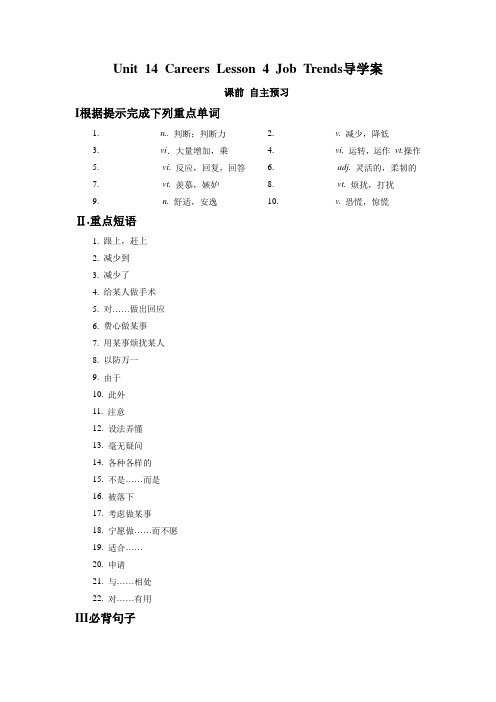
Unit 14 Careers Lesson 4 Job Trends导学案课前自主预习I根据提示完成下列重点单词1. ____________ n.. 判断;判断力2. ____________v. 减少,降低3. ____________vi.大量增加,乘4. ____________vi. 运转,运作vt.操作5. ____________ vi. 反应,回复,回答6. ____________ adj.灵活的,柔韧的7. ____________ vt.羡慕,嫉妒8. ____________ vt.烦扰,打扰9. ____________ n.舒适,安逸10. ____________v. 恐慌,惊慌Ⅱ.重点短语1. 跟上,赶上______________2. 减少到______________3. 减少了______________4. 给某人做手术______________5. 对……做出回应______________6. 费心做某事______________7. 用某事烦扰某人______________8. 以防万一______________9. 由于______________10. 此外______________11. 注意______________12. 设法弄懂______________13. 毫无疑问______________14. 各种各样的______________15. 不是……而是______________16. 被落下_____________17. 考虑做某事_____________18. 宁愿做……而不愿_____________19. 适合…… _____________20. 申请_____________21. 与……相处_____________22. 对……有用______________III必背句子1. There is no doubt that all this new technology is changing the way we work and offering many other ways of working.2. Citizens of the world’s richest and most adva nced nations will find it more and more difficult to keep up with the demand for change.3. It’s not about making men more like women,but helping men to communicate as well.Period 1 Fast Reading目标:1. To get the general ideas of the text .2. To learn Reading Strategies.Teaching steps:Step One :what kind of job do you think will be great?Step Two:Read the text and do ex. 2 and ex. 3. (教材P29)Step Three:Work in group to find out the key phrases.Period 2 Language Points目标:To master the important language points in this lesson.课堂互动探究§核心词汇讲·练·悟1. decrease v.减少,降低decrease by... 减少了...decrease from... to... 从...减少到...词性拓展:decrease n. 减少;减少量a decrease in ... ...的减少on the decrease 在减少应用:(1)The club members ________ ____ two hundred.该俱乐部的会员减少至200人。
高中英语 Unit 14 Careers 14.4 Lesson 4 Job Trends名师课件 北师大版必修5

1234
归纳:decrease既可用作不及物动词,又可用作及物动词。它与不同 的介词搭配表示不同的含义,decrease to表示“减少到(数 目)”,decrease by表示“减少了(数目)”。
1)阅读下面的句子,体会黑体词的词性及含义 Half of the companies in the survey reported a decrease in sales. 在调查中,有一半的公司表示销售额(量)下降。 词性:名词 含义:下降;减少
1234
2)辨析:decrease和reduce The population in some European countries began to decrease. 有些欧洲国家的人口开始减少。 The driver reduced the driving speed.司机减慢了车速。 归纳:decrease 指“渐渐地减少”;reduce指“人为地减少、降低”,强调 在大小、程度或强度方面下降或减少。 3)反义词:increase v.& n. 增加,加大 If their marketing plans succeed,they will increase their sales by 20 percent. 如果他们的营销计划能够成功,他们将提高20%的销售量。
4.The whole nation is in a state of fear following the attacks. panic
一二三四五六
5.She could see that all the other girls were green with jealousy. envy
6.No wonder you didn’t make any effort to ask us,you know what we’d have said. bother
北师大版高中英语必修五Unit14Lesson4JobTrends教案
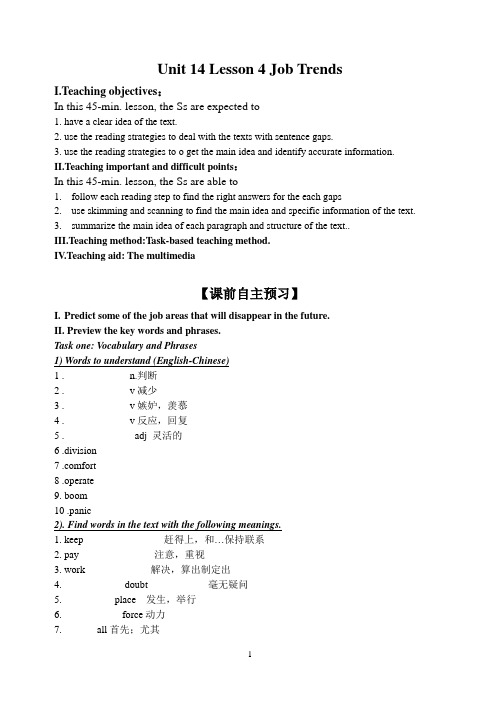
Unit 14 Lesson 4 Job TrendsI.Teaching objectives:In this 45-min. lesson, the Ss are expected to1. have a clear idea of the text.2. use the reading strategies to deal with the texts with sentence gaps.3. use the reading strategies to o get the main idea and identify accurate information.II.Teaching important and difficult points:In this 45-min. lesson, the Ss are able to1.follow each reading step to find the right answers for the each gapse skimming and scanning to find the main idea and specific information of the text.3.summarize the main idea of each paragraph and structure of the text..III.Teaching method:Task-based teaching method.IV.Teaching aid: The multimedia【课前自主预习】I.Predict some of the job areas that will disappear in the future.II. Preview the key words and phrases.Task one: V ocabulary and Phrases1) Words to understand (English-Chinese)1 .___________ n.判断2 .___________ v减少3 .___________ v嫉妒,羡慕4 .___________ v反应,回复5 .____________ adj 灵活的6 .division______________7 .comfort______________8 .operate _____________9. boom _____________10 .panic _____________2). Find words in the text with the following meanings.1. keep______________ 赶得上,和…保持联系2. pay_____________ 注意,重视3. work___________ 解决,算出制定出4. ____________doubt__________ 毫无疑问5. __________place 发生,举行6. ___________ force动力7. ______ all首先;尤其8. according _________ 按照,据…说9. a ____________ of 各种各样的10. have an _______________ 在…方面有优势【课堂进行时】I. While-ReadingTask Two(I) Read the text quickly and get the main idea of the text.What is the main idea of the text?A.Changes in the future.B.The work in the future.C.The future job trends and ways of working.D.The features of work.Answer:cTask Three(II) Read the text carefully and choose the right topic for each paragraph.Task There --Find the right topic for each paragraph.Changes in job ideas Changes in companiesBenefits that the new technology brings to us Improve language skills—English Improve computer skills Changes in job areasBoom in IT The prediction of Future Shock Improve communication skills Dealing with changesTask Four(III) Fill in the blanks with right answers according to the text.Task Five(IV) Figure out the structure of the text.II. Post-Reading(I) Summary:.Task Six(II)Free talk.Try to describe the features(特点) of the jobs you want to find in the future with the help of the words and phrase provided.What do you want to do in the future?Useful V ocabulary: well-paid, creative, steady, interesting, comfortable, fit, safe….Linking:1. Example: such as, for example, especially2. Reason: because, as, since, due to, because of3. Addition: also, as well as, too, in addition, besides, not only… but alsoIII. Homework1.Underline the difficult sentences and key phrases in the text.2.学英语报第13期七选五。
【教学设计】Unit 14 Lesson 4(北师大)
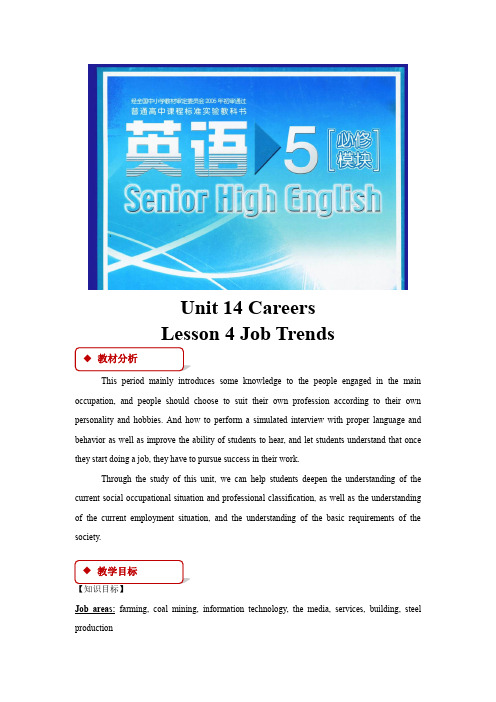
Unit 14 CareersLesson 4 Job TrendsThis period mainly introduces some knowledge to the people engaged in the main occupation, and people should choose to suit their own profession according to their own personality and hobbies. And how to perform a simulated interview with proper language and behavior as well as improve the ability of students to hear, and let students understand that once they start doing a job, they have to pursue success in their work.Through the study of this unit, we can help students deepen the understanding of the current social occupational situation and professional classification, as well as the understanding of the current employment situation, and the understanding of the basic requirements of the society.Job areas: farming, coal mining, information technology, the media, services, building, steel productionSkills: communication skills, computer skills, driving, language skills, typingQualities:creative, flexible, hard-working, motivated, understanding, helpful, good judgment 【能力目标】To practice matching sentences with sentence gaps in a text.To practice vocabulary related to work and jobs.【情感目标】Give advice on the job choice..【教学重点】1. To learn some useful expressions2. To practice finding correct sentences for each gap by using the reading strategies【教学难点】1. To learn to use the reading strategies in a passage with gap2. To learn to use the important phrasesMultimediajudgment decreasearithmetic multiplydivision branchoperate dynamicrespond flexibleenvy bothercontinent comfortin case keep up withslave boom panicStep2. Lead inDiscussion:1. What job area do you want to commit yourself to in the future? Choose one from the following. TeacherDoctorBarberWriterAstronautScientistArtistTV presenterActor2. What skills and qualities are useful to get a good job nowadays?Skills: communication skills, computerskills, driving, language skills, typing, etc.Qualities: creative, flexible, hard-working, motivated,understanding, helpful, good judgment, etc.Step2. ReadingFast readingJudge the following sentences to be True (T) or False (F).1. Toffler’s prediction has come true.2. There is nothing we can do to keep up with the demand for change.3. The number of jobs in information technology will go down dramatically.4. The idea of “job for life” is still fashionable.5. People will work for small, dynamic companies as well as big companies.6. It doesn’t matter if one can’t cope with cultural differences.7. People prefer to work from home rather than go to office.Careful readingTask 1: Read the sentences below and the text carefully. Find the correct sentences (a-f) for each gap (1-6) in the text.a) On the other hand, the services industry, the media and information technologyare booming.b) Because of this, people who work with computer will be in much greater demand.c) However, understanding other people —their minds, culture and history — will be very important.d) First of all, don’t panic.e) They will also need people who can work together and get on well in a team.f) Because of this, workers will have to be more flexible.Task 2:Fill in the blanks.Read the text again and compare the past to the future.Task 3: Answer the following questions:1.What is “future shock”?“Future shock” is that between now and 21st century, citizens of the world’s richest and most advanced nations will find it more and more difficult to keep up with the demand for change.2. What is one of the job areas of the future?The services industry, the media and information technology.3. How will jobs change?People will not work for one company.4. How will companies change?They will be organized more democratically.5. What skills and personal qualities will people need?Communication skills, computer skills,working with people from different cultures.6. What personal benefits will the new situation bring?You can live where you want, continue your studies and have more free time.Step3. Languages Points1. advanced adj.1) 高度发达的,复杂的England is an advanced industrial country.英国是一个发达的工业国家。
北师大版英语 必修五 Unit 14 lesson 4 Job Trends reading 课

I. Free talk 1.What kind of job do you like most? 2.What kind of jobs do you want to find? (steady, creative, well-paid, fit yourself ,safe, comfortable, interesting......)
StepⅤ. Homework
Then write a composition about your favorite job in the future.
Thanks
福建新大陆电脑股份有限公司
第13页
2021/5/23
beginning to 2.__p__a_y_a_t_te_n_t_io_n__to____Toffler’s idea.Some important
changes 3.__h_a_v_e_t_a_k_e_n_p_l_a_c_e_. Companies will 4.___o_p_e_r_a_t_e___in different ways. So good 5.__c_o_m_m__u_n_ic_a_t_io_n__ skills will be extremely important .Since
Read the text a third time,then fill in the blanks.
Alvin Toffler has written a book Future shock ,which predict rapid changes will arrive soon for 1.____a_d_v_a_n_c_e_dnations.Now people are
北师大版高中英语Unit14 Lesson4 Job Trends(说课稿)焦作十一中

Lesson4Job Trends(说课稿)一、学情分析1、本课授课对象为焦作市第十一中学重点班学生,多数学生学习主动性强,具有学习的目标性和积极思考的能力,并且学生对图片、录像或故事等还是比较感兴趣,好奇心强,通过千方百计调动学生的积极性,学生学习和使用英语的积极性会比较高。
2、通过模块1和模块2的学习,学生已经初步把握熟悉了以话题为主的单元构成,而且发展了相关话题的词汇和拓展话题的基本能力。
3、笔者授课班级已组成了合作学习小组,他们是按照同学的学科优劣、个性等搭配而成,平时经常进行小组活动,有合作基础和经验。
二、教材分析Lesson4Job Trends属于北京师范大学出版社出版的高中英语必修模块5 Unit14Careers。
这一版块主要介绍了人们从事的主要职业,人们要根据自己的个性和爱好选择适合自己的职业,以及如何通过恰当的语言和行为进行模拟的面试,提高学生的听说能力,同时让学生了解一旦开始做某项工作,就要追求在工作中取得成功,成功的秘诀是什么?在本单元的最后,也就是本课的内容,即通过向学生介绍当今工作领域的变化潮流以及顺应工作潮流而要求求职者必须掌握的技能和品质,通过本课的学习,是学生认识到危机意识,以及尽早准备,努力学习,掌握必要的技能和品质,从而是自己在未来的职场中立于不败之地,也就是“Survival of the Fittest”。
最后通过本单元的学习,可以帮助学生加深对当今社会职业情况及职业分类的理解,以及对当前就业形势的了解和社会对人才的基本要求的了解,初步了解求职的必备技能以及必备素质,以及在求职过程中用英语交流的技能,提高他们的跨语言交际能力以及应变能力三、教学理论新课程提倡学生自主学习,教师应从单纯注重知识传授转为关注学生的学习方式、学习愿望和学习能力的培养,要引导学生质疑、调查、探究,在实践中学习,富有个性地学习,为他们的终身发展打下良好的基础。
本节课力求体现新课程理念和英语教学的人文性。
高中英语Unit 14 Lesson 4 Job Trends教案 北师大版 必修5
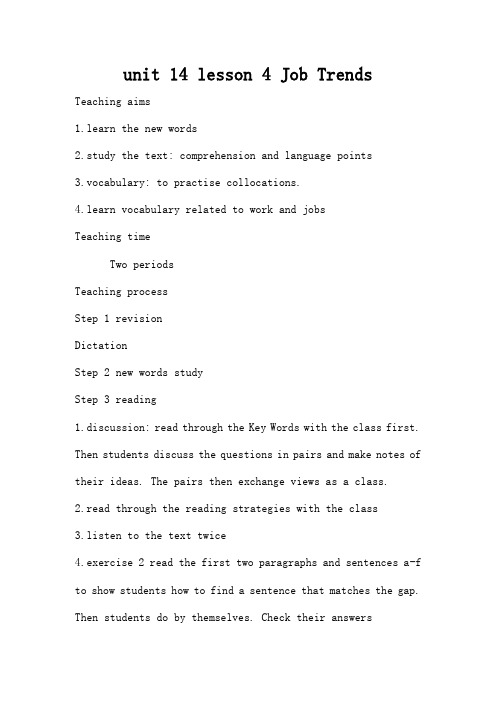
unit 14 lesson 4 Job TrendsTeaching aims1.learn the new words2.study the text: comprehension and language points3.vocabulary: to practise collocations.4.learn vocabulary related to work and jobsTeaching timeTwo periodsTeaching processStep 1 revisionDictationStep 2 new words studyStep 3 reading1.discussion: read through the Key Words with the class first. Then students discuss the questions in pairs and make notes of their ideas. The pairs then exchange views as a class.2.read through the reading strategies with the class3.listen to the text twice4.exercise 2 read the first two paragraphs and sentences a-f to show students how to find a sentence that matches the gap. Then students do by themselves. Check their answers5.read the text and ask them to answer the questions in exercise 3.6.exercise 4 read the example prediction with the class and compare the wording with the original wording in the text. Then students write down some of the predictions in the text in their own words.7.discuss what things the students can do to improve their future career prospects.Step 4 vocabulary: collocations1.exercise 6 let students classify these words from the text that often go together.2.exercise 7 ask some students to do on the blackboardstep 5 homeworkexercise 8 on page 29。
北师大unit14lesson4jobtrend学案
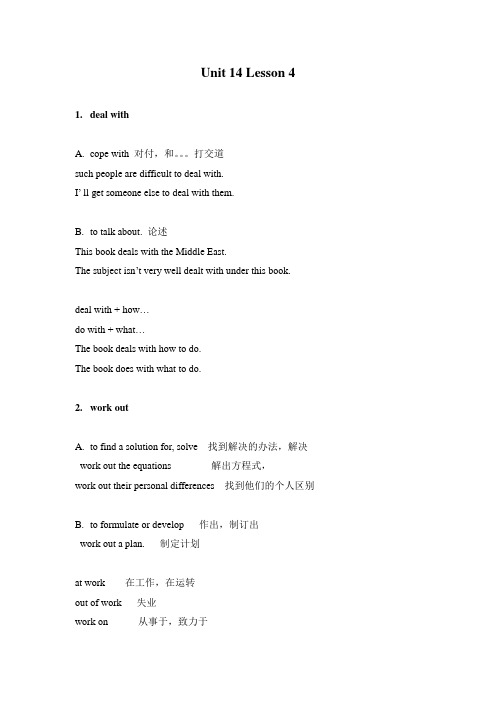
Unit 14 Lesson 41.deal withA.cope with 对付,和。
打交道such people are difficult to deal with.I’ ll get someone else to deal with them.B.to talk about. 论述This book deals with the Middle East.The subject isn’t very well dealt with under this book.deal with + how…do with + what…The book deals with how to do.The book does with what to do.2.work outA.to find a solution for, solve 找到解决的办法,解决work out the equations 解出方程式,work out their personal differences 找到他们的个人区别B.to formulate or develop 作出,制订出work out a plan. 制定计划at work 在工作,在运转out of work 失业work on 从事于,致力于work off 消除,去除3.offer vt : to giveA.to put forward for consideration, proposeI must offer them an apology for not going to attend their get-together. B.to exhibit readiness or desire to doHe offered to go.offer one’s hand 伸出手offer to treat 请客offer sth to sb 把某物供给某人offer sb st4.doubtThere is little/no doubt that 当doubt以肯定形式出现,从句为肯定句There some/a doubt wh.. 当doubt以否定形式出现是,从句为疑问句式I don’t doubt that he will come.I doubt whether he will come.5. take place: to happen (not in passive voice)When did the conversation take place?in place 恰当,在适当的位置out of place 不恰当in place of 取代,代替take one’s place 入座,代替某人take the place of 代替,取代6. instead , instead ofThere was no bus then. We had to walk home instead.= We walk home instead of by bus.Don' write to him, call him instead. = call him instead of writing to him.7. remain + to do 有待做adj./ v.ing / p.p./ n. 继续保持。
北师大版Unit14 Lesson4说课稿
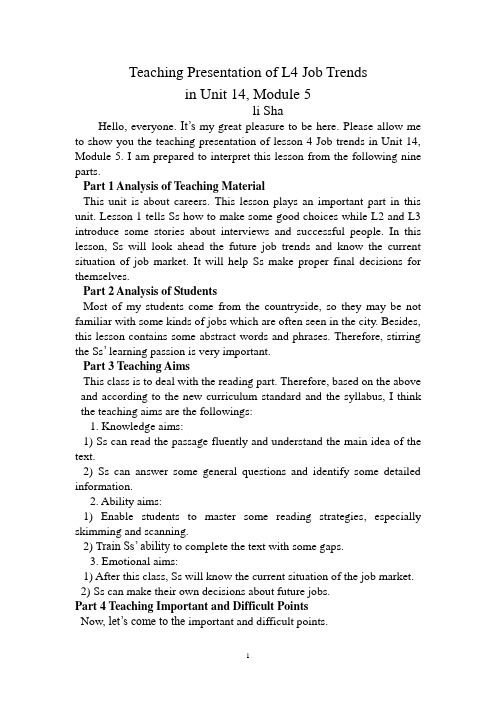
Teaching Presentation of L4 Job Trendsin Unit 14, Module 5li ShaHello, everyone. It’s my great pleasure to be here. Please allow me to show you the teaching presentation of lesson 4 Job trends in Unit 14, Module 5. I am prepared to interpret this lesson from the following nine parts.Part 1 Analysis of Teaching MaterialThis unit is about careers. This lesson plays an important part in this unit. Lesson 1 tells Ss how to make some good choices while L2 and L3 introduce some stories about interviews and successful people. In this lesson, Ss will look ahead the future job trends and know the current situation of job market. It will help Ss make proper final decisions for themselves.Part 2 Analysis of StudentsMost of my students come from the countryside, so they may be not familiar with some kinds of jobs which are often seen in the city. Besides, this lesson contains some abstract words and phrases. Therefore, stirring the Ss’ learning passion is very important.Part 3 Teaching AimsThis class is to deal with the reading part. Therefore, based on the above and according to the new curriculum standard and the syllabus, I think the teaching aims are the followings:1. Knowledge aims:1) Ss can read the passage fluently and understand the main idea of the text.2) Ss can answer some general questions and identify some detailed information.2. Ability aims:1) Enable students to master some reading strategies, especially skimming and scanning.2) T rain Ss’ ability to complete the text with some gaps.3. Emotional aims:1) After this class, Ss will know the current situation of the job market.2) Ss can make their own decisions about future jobs.Part 4 Teaching Important and Difficult PointsNow, let’s come to the important and difficult points.1. How to increase S s’ reading interest?2. How to achieve the teaching objects better?3. How to stress the important points and break through the difficult points?Part 5 Teaching and Learning MethodsAs we all know, a good teacher should play a leading part as a director and make students the real masters in class. So, I will use the following1.a computer2.the multimedia3. the blackboardAbove is my teaching plan for L4 Job Trends. Thank you for your listening!。
高中英语Unit14《Careers》Lesson4JobTrends教案北师大版

北师大必修五Unit14 Lesson 4 教学设计Objectives★To practice matching sentences with sentence gaps in a text.★To practice vocabulary related to work and jobs.Teaching difficulties:To practice connecting sentences within a paragraph.Teaching Aids: CAITeaching procedures:Ⅰ.Warming-upHave a free talk with the SsT : If we go to a new country, what will we meet ?S: Culture shockT: If we go to future, what will we meet?S: Future shockT: What cause the future shock?S: What will be changed in the future?Ⅱ. ReadingTask1: First readingRead the text quickly and try to find out the changes in the future according to the text.Task2: Second readingRead the sentences below and the text. Then follow the steps in the Reading Strategies to find the correct sentences (a-f) for each gap (1-6) in the text.the other hand, the service industry, the media and information technology are booming.b. Because of this, people who work with computers will be in much greater demand.c. However, understanding other people, their minds, culture and history will be very important.d. First of all, don’t panic.e. They will also need people who can work together and get on well in a team.f. Because of this, workers will have to be more flexible.Task3: Post-ReadingRead the article again and answer these questions1.What is “future shock” ?2. What is one of the job areas of the future?3. How will jobs change?4. How will companies change?5. What skills and personal qualities will people need?6. What personal benefits will the new situation bring?Ⅲ.Language pointsout (verb phrase)eg: He was meant to work out these math problems all alone.2. rather thaneg: He was a friend rather than a mother.to 做出反应eg: How did he respond to the news?He liked the children, and they responded to him.(vt) doing/n.eg: Don’t bother me.It’s no need to bother asking himto do/ doing/n./adj.I am considering buying a new watch.Am I considered to be a good teacher?=Am I considered a good teacher?to 对某事作出反应, 对某人有疗效。
高中英语新北师大版版精品教案《Lesson 4 Job Trends》
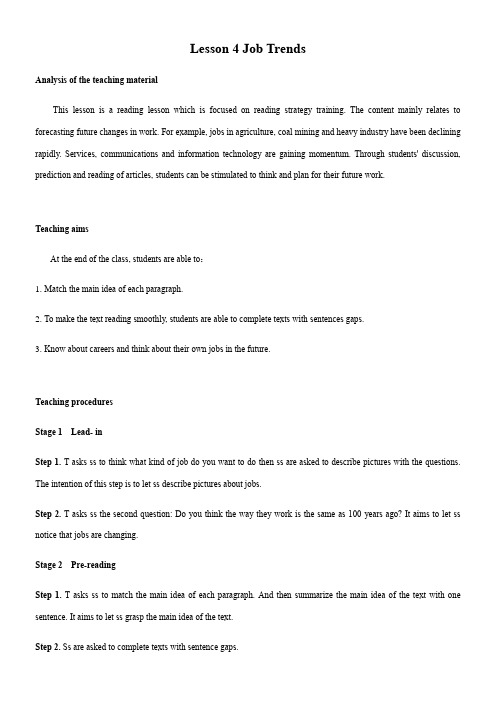
Lesson 4 Job TrendsAnalysis of the teaching materialThis lesson is a reading lesson which is focused on reading strategy training. The content mainly relates to forecasting future changes in work. For example, jobs in agriculture, coal mining and heavy industry have been declining rapidly. Services, communications and information technology are gaining momentum. Through students' discussion, prediction and reading of articles, students can be stimulated to think and plan for their future work.Teaching aimsAt the end of the class, students are able to:1.Match the main idea of each paragraph.2.To make the text reading smoothly, students are able to complete texts with sentences gaps.3.Know about careers and think about their own jobs in the future.Teaching proceduresStage 1 Lead- inStep 1. T asks ss to think what kind of job do you want to do then ss are asked to describe pictures with the questions. The intention of this step is to let ss describe pictures about jobs.Step 2. T asks ss the second question: Do you think the way they work is the same as 100 years ago? It aims to let ss notice that jobs are changing.Stage 2 Pre-readingStep 1. T asks ss to match the main idea of each paragraph. And then summarize the main idea of the text with one sentence. It aims to let ss grasp the main idea of the text.Step 2. Ss are asked to complete texts with sentence gaps.Stage 3 While-readingStep 1. T asks students to read paragraph 1-2 and answer the two questions: 1. What is “future shock”? 2. What should you do in facing the future shock?Step 2. Ss are asked to fill the chart after reading paragraph 3-6:Step 3. Ss are asked to think about this question: To keep up with these changes, what should we prepare? To answer this question, ss need to read paragraph 7-9.Stage 4 After readingSs are asked to read a job advertisement in Culture Corner of this unit. Then, think about this question: What does the title “Survival of the Fittest”mean?Homework: Write down the job you want to do in the future and polish it.学案1.Match the main idea with each paragraph.2.What is the main idea of the passage?It aims to _______ the future job trends and tell us what kind of _______ and _______ are needed to ______ the challenge.3.Fill in the chart.。
Unit14CareersLesson4JobTrends教学设计1-优质公开课-北师大必修5精品

Unit14CareersLesson4JobTrends教学设计1-优质公开课-北师大必修5精品Unit 14 CareersLesson 4 Job Trend教课方案ObjectivesTo practise matching sentences with sentence gaps in a text.To practise vocabulary related to work and jobs.To practise collocations (verb + noun, verb + adverb, verb+ adjective).Possible problemsIf students read at sentence level rather than at discourselevel, i.e. connecting sentences within a paragraph, they may find difficulty fitting in the missing sentences.Students may have problems with collocations of words.Teaching pointsThe article describing future work trends is based on Future Shock, a book by Alvin Toffler, a social psychologist.His book analysed the effects of rapid technological change on the individual, the family and society.Quote: Katherine Whitehorn was a popular British journalist and writer in the 1970s/80s.Routes through the materialIf you are short of time, set Exercise 7 for homework and omit Exercise 5.If you have time, do the Option activity.If you have two periods for this lessons, a suitable naturalbreak is after Exercise 5.ReadingBefore you startUnit14CareersLesson4JobTrends教学设计1-优质公开课-北师大必修5精品Exercise 1Job areas: agriculture, coal mining, information technology,the media, professional services, shipbuilding, steelSkills: communication skills, computer skills, driving,language skills, organizational ability, typingQualities: co-operation, creativity, cultural awareness,flexibility, initiative, motivationReadthroughtheKeyWordswiththeclass.Elicitspecificexamplesof“ organisa bility ” (e.g.planningyour work,organising a meeting) and“ communication ski on the telephone, in meetings).Students then discuss the questions in pairs andmake notes of their ideas.The pairs then exchange views as a class.Read to learnExercise 2Read through the strategies with the class. Follow the stages reading the firsttwo paragraphs and sentences a-f toshow students how to find a sentence thatmatches the gap.Students work individually, following the stages in theReading Strategies and fitting the sentences into the gaps.Students compare answers in pairs before checking answers as a class.Answers1 d2 a3 b4 f5 e6 cExercise 3Students read the article again and make notes of theanswers.Students work in pairs comparing their answers.Suggested Answers1 The speed of change that affectspeople’ s lives and work.2 business and professional services, the media, informationtechnology,biosciences3 People will have different contracts, not work for one company.4 They will be organised more democratically.5 communication skills, computer skills, working with people fromdifferent cultures6 You can live where you want, continue your studies and have a lot more free time.Students discuss whether they agree with the predictions in the text. Do they think people will have more free time?Will agriculture continue to decline? What will happen if it does?Exercise 4Read the example prediction with the class and compare the wording withthe original wording in the text. Elicitanother prediction from the students and have them use their own words to express the idea.Students work individually, writing down some of the predictions in the textin their own words.Some of the students then read their predictions to the class.Exercise 5In pairs, students discuss what they can do to improve their future career prospects. Encourage students to talkabout a specific career if they know what they want to do and to talk more generally if they have not yet decidedwhat they want to do.Some of the students then report their ideas to the class.Vocabulary: CollocationsExercise 6Students work in pairs, classifying the words and puttingthem in the correct column in the table.Answersverb + noun: have a free time, pay attention, take a deep breathverb + adverb: do badly, react quickly, rise dramaticallyverb + adjective: become self-employed, feel comfortable, find (something) difficultExercise 7Students do the exercise individually. Ask them to pay attention to the verb tense.Check students’ answersavingbyh them read out the sentences.Answers1 feel comfortable2 rose dramatically3 have free time4 become self-employed5 react quickly6 find / difficult / do badlyExercise 8Students work in pairs completing their vocabulary networks with the wordsin the list.Check students ’ answers by having them read out the four verb collocations for each verb.1 an exam2 somebody a favor3 your homework4 your best5 an excuse6 a mistake7 money8 a suggestion 9 my own business10 an accident 11 a career15 married 16 a promotionExercise 9Give students time to work out some sentences about themselves using the collocations from Exercise 8.Students then work in pairs saying sentences about themselves. Some of the students say their sentences to theclass.QUOTE ⋯ UNQUOTERead the quote with the class and ask students to describe an ideal job for them which they like doing and are paidto do.PracticeWrite these sentences on the board, leaving a gap between the two sentences: Frank had worked as a shipbuilder since he left school.Because of this, he lost his job.Carol was surprised when the Careers Adviser asked her if she liked animals.She hadn ’ t thought of doing that before.In pairs, students discuss and write the missing sentence(s).Tell them they can write more than one sentence ineach text if they want to.The pairs then read out their texts to the class.Extension and homeworkBesides the job trends described in the text, will there be any other changesin the job areas? Ask students to usetheir knowledge and imagination to predict other changes that are likely to take place in the workplace in 20 years.They can either discuss in groups or as a whole class.。
- 1、下载文档前请自行甄别文档内容的完整性,平台不提供额外的编辑、内容补充、找答案等附加服务。
- 2、"仅部分预览"的文档,不可在线预览部分如存在完整性等问题,可反馈申请退款(可完整预览的文档不适用该条件!)。
- 3、如文档侵犯您的权益,请联系客服反馈,我们会尽快为您处理(人工客服工作时间:9:00-18:30)。
Unit 14 Lesson 4教学指导
1.now peop0le are beginning to pay attention to Toffler’s prediction,because the speed of change is accelerating rapidly.
.pay attention to注意
eg: You should pay much attention to your pronunciation.
Much attention should be paid to your pronunciation.
.pay/give attention to sth.注意某事
.draw one’s attention引起某人的注意
.attract one’s attention吸引某人的注意
bring one’s attention让某人注意
be worth one’s attention值得某人注意
2.the number of 与a number of
.a number of的意思是“若干”或“许多”,相当于some 或a lot of,和复数名词连用.作主语时谓语用复数.
.the number of后面跟的名词也是复数,不同的是,这里的谓语动词要用单数形式. Eg: A number of highly qualified scholars have worked in Singapore.
The number of undergraduates has increased over the years.
3.take a deep breath做深呼吸
above one's breath大声, 说出声
at a breath一口气
bate one's breath(因恐惧或激动)屏息, 连大气也不敢出
below one's breath低声地
under one's breath低声地
catch one's breath恢复呼吸, 歇一口气
draw a breath深深地吸一口气
take a breath深深地吸一口气
draw a long breat深深地吸一口气
take a long breath深深地吸一口气
draw one's first breath出生, 出世
draw one's last breath断气, 咽气
fetch one's breath缓过气来; 苏醒过来
hold one's breath(因恐惧或激动)屏息, 暂时停止呼吸 ;屏息以待, 非常紧张地等待着
keep one's breath(因恐惧或激动)屏息, 暂时停止呼吸 ;屏息以待, 非常紧张地等待着
in a breath一瞬间 ;齐声地, 一口气
in one breath同时, 齐声地
in the same breath同时; 相提并论
lose one's breath喘不过气来
not a breath of一点儿没有
out of breath喘不过气来
put out of breath使某人喘不过气来, 使(某人)上气不接下气
put sb. out of breath使某人喘不过气来, 使(某人)上气不接下气
short of breath呼吸困难, 呼吸短促, 喘不过气来
spend one's breath (=waste one's breath)白说, 白费口舌
stop sb.'s breath闷死某人
take breath歇一歇; 喘口气
take one's breath away使某人大为惊讶或感动
to the last breath至死
with one's bad breath心怀恶意。
